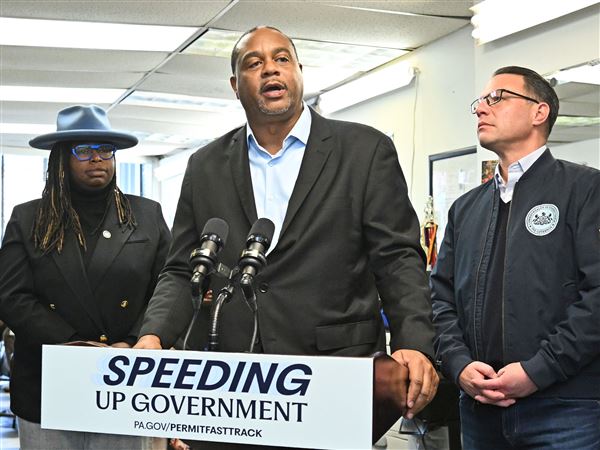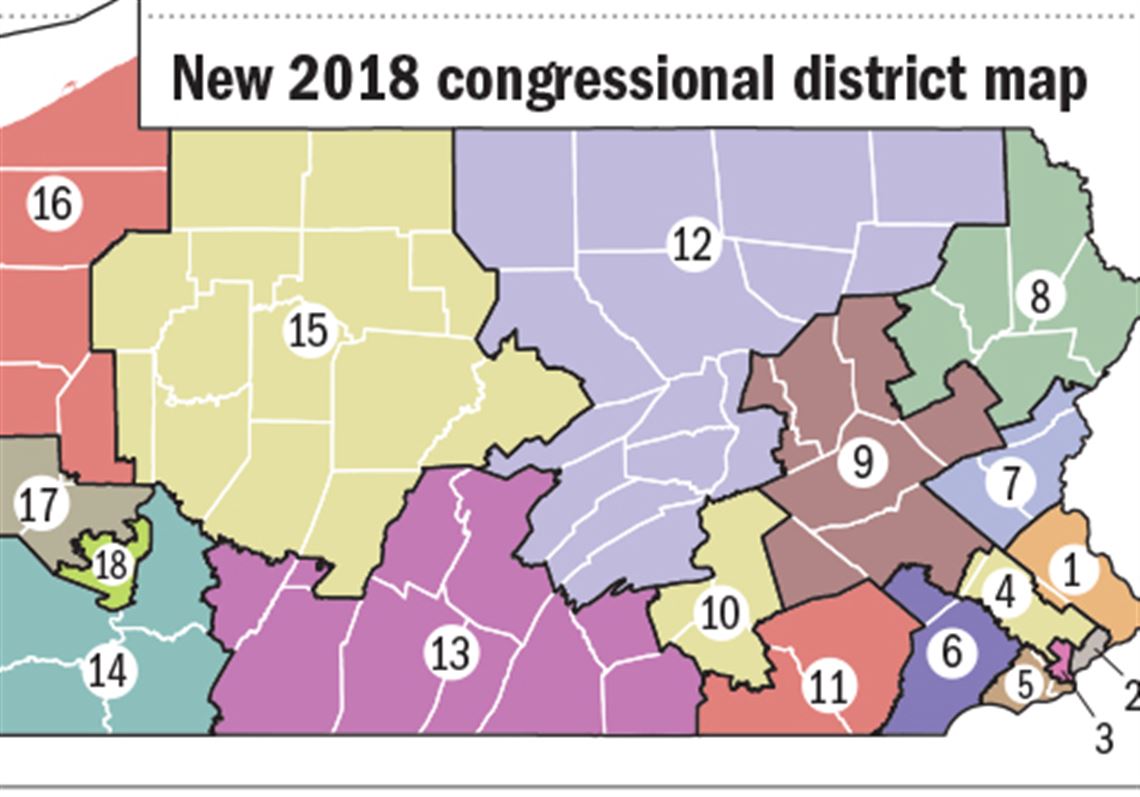Democrats have trumpeted that they are the brave defenders of democratic norms in the Trump era, fighting for political maps that give voters a true voice.
They celebrated in January when the Pennsylvania Supreme Court struck down the state’s congressional district map as gerrymandered, casting themselves as political victims finally receiving justice from the courts.
For six years, they had struggled under districts carefully constructed to ensure Republicans a majority of the state’s congressional delegation in a competitive state. With the brand-new lines raising fresh hopes for November, they now have a chance to flip numerous seats in Pennsylvania, and maybe even take back control of the U.S. House.
“Loving this map. Exactly what I was fighting [for]. Fair. And. Reflective,” tweeted Margo Davidson, a Delaware County state lawmaker running for Congress.
“Major win for democracy,” retweeted Philadelphia City Councilman Kenyatta Johnson, a former member of the General Assembly.
“The new Pa. congressional map went from 28 county splits in 2011 to 13,” tweeted State Rep. Maria Donatucci, touting the map’s respect for county boundaries.
But all those Democrats omitted an important detail: Each one joined with the GOP legislative majority in 2011 to pass the map that the state’s highest court would toss out as a Republican partisan gerrymander.
In all, three dozen state Democrats joined Republicans to push the map through; it would not have passed without the minority party’s backing.
To voters in 2018, that might seem unbelievable. After all, why would Pennsylvania Democrats help give the speaker’s gavel to John Boehner and Paul Ryan?
The answer is a reminder that all politics, even when they play out on a national scale, are local.
With voters focused on gerrymandering like never before, though, Democrats’ votes could come back to haunt them. In fact, in some congressional races, they already have.
“They voted for the original gerrymander and now they’re trying to pretend like they didn’t,” said liberal activist David Diano after a public tête-à-tête with Ms. Davidson. “That’s the height of hypocrisy.”
*
In 2010, Republicans incensed by then-President Barack Obama hatched a grand plan rooted in the idea that all politics only start local: Win enough statehouses to control redistricting across the country, they saw, and you can remap America in your favor.
In Pennsylvania, Republicans already controlled the state Senate and had Tom Corbett in the governor’s office in 2010. They had been outnumbered by Democrats in the state House, though, until they took control that November.
Democrats, on the other hand, were disorganized. And in Pennsylvania, few leaders were looking out for the Democratic Party as a whole.
In that vacuum, individual and regional interests prevailed.
More than one in three Democrats in the state House voted for the 2011 map. Most were from the Philadelphia and Pittsburgh areas, where incumbent Democrats in Congress were largely protected under the new lines.
In Philadelphia, Chaka Fattah kept a strong seat. In Montgomery County, Allyson Schwartz moved to a safer Democratic district as she was considering a run for governor, freeing her up to raise money. The district represented by Bob Brady, a white Philadelphia congressman with an increasingly black electorate, became whiter.
In many cases, the state legislators’ votes were encouraged by their Democratic member of Congress.
“My politics are always local,” said Mr. Johnson, then a Democrat in the state House.
The Inquirer and Daily News spoke with more than a dozen Democratic state and federal lawmakers who supported the map in 2011. Almost all said they did so because of the way it affected their local districts.
Mr. Brady, head of the Philadelphia Democratic Party, said he, Fattah and Schwartz each reached out to allies in Harrisburg.
Curtis Thomas, a Philadelphia-based state lawmaker, said that “we got letters from our congressmen, acknowledging that the plan was OK.” In Pittsburgh, State Rep. Harry Readshaw said a Democrat in Congress — he declined to say who — sent him a note encouraging his vote.
“When the overwhelming majority of the Democrats who were representing Pennsylvania supported the plan — [and] asked members of the House Democratic caucus to support the plan — I did not have reservations supporting [the map],” said Mark Cohen, then a state representative and today a judge in the Philadelphia Court of Common Pleas.
High-ranking Democrats in the state House also encouraged their members to vote for the map, lawmakers said, describing it as being “agreed upon” by their leaders.
Frank Dermody, leader of the House Democrats now and in 2011, denied “whipping for votes” — and said he voted against the plan because it was clear it was a Republican gerrymander. But he also did not ask his members to join him, he said, because the Democratic representatives did not agree on a position.
“The Republicans were in the majority and were going to pass whatever map they wanted,” Mr. Dermody said. “And the minority, it’s not fun. So you can’t blame our members or even the members of Congress, because they got what they could get.”
Enough Republicans opposed the map that Democrats, if unified, could have blocked it. But some Democrats saw the proposed map, which protected almost all their incumbents, as the best possible outcome under GOP rule.
Given population loss, Pennsylvania needed to lose one seat. With Republicans in control, Democrats saw it as inevitable that they would be the ones to give up the seat. If they fought back, it could certainly be worse, they thought.
"It was gunpoint bipartisanship," said Mr. Cohen. "Democrats were afraid their districts would be cut up into a lot of pieces.”
Two incumbent western Democrats, Jason Altmire and Mark Critz, were drawn into the same district; Altmire wrote a letter to state Democrats, asking them to support the map. Mr. Altmire ultimately lost in the primary election to Mr. Critz, who in turn lost to a Republican in the general election, resulting in the surprise loss of two seats in 2012.
Democrats also said they were under pressure because they needed to pass a map. By the time the legislature voted in December, the primary elections were just a few months away.
“At some point it needed to get done,” said Bucks County Rep. John Galloway.
Thaddeus Kirkland, a Delaware County congressional candidate who was a state representative at the time, agreed that he didn’t want to be an obstructionist: “It comes to a point in time where you just have to cut bait or fish, and start moving it forward.”
At a federal gerrymandering trial in December, mapmakers said under oath that Mr. Brady reached out to provide input during the mapmaking process.
In an interview, Mr. Brady described being given two options: One was the map that ended up being implemented, which had three congressional districts with significant portions of Philadelphia, while the other would have given the city essentially only two. Mr. Brady, the powerful longtime head of the Philadelphia Democrats, chose the map that gave his city more muscle.
“I don’t care about the rest. … I’m just concerned about Philadelphia, which I should be,” he said.
Mr. Brady said he wasn’t shown the map of the rest of the state. He didn’t ask to see it, he said, because he didn’t need to.
“I’m not in charge of Pennsylvania. I protected Philadelphia,” he said. “I didn’t know what the rest of the map looked like, nor did I know whether or not it was good for them or bad for them.”
Other Democrats have regrets.
“If I realized how bad it was, I don’t think none of us guys would have voted for it,” said State Rep. Anthony DeLuca of Pittsburgh. “It was a bad vote for the commonwealth. It was a bad vote for the country, okay? I didn’t know that they were going to switch all them seats.”
But like so many other Democrats, Mr. DeLuca said he voted for it for one simple reason: It was good for his local congressman, Mike Doyle, of the Pittsburgh area.
All politics, remember, is local.
*
If no one was paying attention to gerrymandering in 2011, it can sometimes feel as if everyone is now.
The majority of Pennsylvania voters have been closely following the Pennsylvania Supreme Court’s ruling on the congressional map, according to a recent poll by Muhlenberg College and the Allentown Morning Call. One in four said they’ve been tracking it “very closely.”
Gov. Tom Wolf, the head of the state Democratic Party, has made opposition to gerrymandering a part of his reelection campaign.
Fair Districts PA, a redistricting reform group, has been mobilizing thousands of voters behind a proposal to take mapmaking out of the hands of state lawmakers by creating an independent citizens commission.
Of the 20 Democrats who voted for the map in 2011 and remain in the House today, 18 back the Fair Districts commission idea.
Some of those Democrats have already been put on the defensive. A liberal activist, David Diano, on Facebook recently called on voters to reject Ms. Davidson, the Delaware County state representative, and Mr. Kirkland, the Delaware County mayor, in their congressional bids in the newly formed Fifth District.
Mr. Kirkland said he has heard “not one iota” about gerrymandering from those he’s talked to on the campaign trail.
Ms. Davidson echoed that in a reply to Diano’s post, saying that “obviously, voters are more concerned about what we do for them.” She later said in an interview that she voted for the map because Mr. Brady asked her to, and that it could have been worse for Southeastern Pennsylvania.
Mustafa Rashed, a Democratic political consultant, doubted the lawmakers’ gerrymandering votes would hurt them because it happened so long ago and there are “more substantive issues” affecting Pennsylvanians. “I don’t think that’ll stick,” he said.
Still, it remains a sensitive issue. Several Democrats who supported the map did not respond to email and phone inquiries, and Bill Keller, a retiring state representative from Philadelphia, hung up on a reporter when asked about his vote for the map.
Meanwhile, Democrats are gearing up for the 2021 redistricting round, following the Republican's 2011 playbook and building their own redistricting machine.
The National Democratic Redistricting Committee, which is led by former U.S. Attorney General Eric Holder, has 12 states, including Pennsylvania, on its target list for 2018. Its goal in this battleground state, where all politics are local but shape the nation: Keep the governor’s office and try to flip the state House and state Senate.
“When you’re holding all the cards, you sometimes tend to overplay your hand. And the GOP overplayed their hand, and that is why they’re in the position they’re in today,” said Larry Ceisler, a longtime Philadelphia political observer. “Now we’ll see: Will the Democrats overplay their hand when they’re given the levers to handle this?”
First Published: April 30, 2018, 5:45 p.m.














